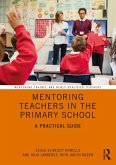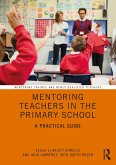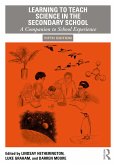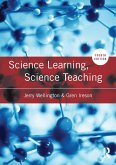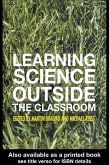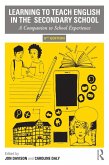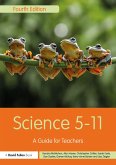Mentoring Science Teachers in the Secondary School (eBook, ePUB)
A Practical Guide
Redaktion: Salehjee, Saima
29,95 €
29,95 €
inkl. MwSt.
Sofort per Download lieferbar

15 °P sammeln
29,95 €
Als Download kaufen

29,95 €
inkl. MwSt.
Sofort per Download lieferbar

15 °P sammeln
Jetzt verschenken
Alle Infos zum eBook verschenken
29,95 €
inkl. MwSt.
Sofort per Download lieferbar
Alle Infos zum eBook verschenken

15 °P sammeln
Mentoring Science Teachers in the Secondary School (eBook, ePUB)
A Practical Guide
Redaktion: Salehjee, Saima
- Format: ePub
- Merkliste
- Auf die Merkliste
- Bewerten Bewerten
- Teilen
- Produkt teilen
- Produkterinnerung
- Produkterinnerung

Bitte loggen Sie sich zunächst in Ihr Kundenkonto ein oder registrieren Sie sich bei
bücher.de, um das eBook-Abo tolino select nutzen zu können.
Hier können Sie sich einloggen
Hier können Sie sich einloggen
Sie sind bereits eingeloggt. Klicken Sie auf 2. tolino select Abo, um fortzufahren.

Bitte loggen Sie sich zunächst in Ihr Kundenkonto ein oder registrieren Sie sich bei bücher.de, um das eBook-Abo tolino select nutzen zu können.
This practical guide helps mentors of new science teachers in both developing their own mentoring skills and providing the essential guidance their trainees need as they navigate the rollercoaster of the first years in the classroom.
- Geräte: eReader
- ohne Kopierschutz
- eBook Hilfe
- Größe: 17.47MB
Andere Kunden interessierten sich auch für
![Mentoring Teachers in the Primary School (eBook, ePUB) Mentoring Teachers in the Primary School (eBook, ePUB)]() Mentoring Teachers in the Primary School (eBook, ePUB)29,95 €
Mentoring Teachers in the Primary School (eBook, ePUB)29,95 €![Mentoring Teachers in the Primary School (eBook, PDF) Mentoring Teachers in the Primary School (eBook, PDF)]() Mentoring Teachers in the Primary School (eBook, PDF)29,95 €
Mentoring Teachers in the Primary School (eBook, PDF)29,95 €![Learning to Teach Science in the Secondary School (eBook, ePUB) Learning to Teach Science in the Secondary School (eBook, ePUB)]() Learning to Teach Science in the Secondary School (eBook, ePUB)30,95 €
Learning to Teach Science in the Secondary School (eBook, ePUB)30,95 €![Science Learning, Science Teaching (eBook, ePUB) Science Learning, Science Teaching (eBook, ePUB)]() Jerry WellingtonScience Learning, Science Teaching (eBook, ePUB)41,95 €
Jerry WellingtonScience Learning, Science Teaching (eBook, ePUB)41,95 €![Learning Science Outside the Classroom (eBook, ePUB) Learning Science Outside the Classroom (eBook, ePUB)]() Learning Science Outside the Classroom (eBook, ePUB)39,95 €
Learning Science Outside the Classroom (eBook, ePUB)39,95 €![Learning to Teach English in the Secondary School (eBook, ePUB) Learning to Teach English in the Secondary School (eBook, ePUB)]() Learning to Teach English in the Secondary School (eBook, ePUB)31,95 €
Learning to Teach English in the Secondary School (eBook, ePUB)31,95 €![Science 5-11 (eBook, ePUB) Science 5-11 (eBook, ePUB)]() Kendra McMahonScience 5-11 (eBook, ePUB)28,95 €
Kendra McMahonScience 5-11 (eBook, ePUB)28,95 €-
-
-
This practical guide helps mentors of new science teachers in both developing their own mentoring skills and providing the essential guidance their trainees need as they navigate the rollercoaster of the first years in the classroom.
Dieser Download kann aus rechtlichen Gründen nur mit Rechnungsadresse in A, B, BG, CY, CZ, D, DK, EW, E, FIN, F, GR, HR, H, IRL, I, LT, L, LR, M, NL, PL, P, R, S, SLO, SK ausgeliefert werden.
Produktdetails
- Produktdetails
- Verlag: Taylor & Francis eBooks
- Seitenzahl: 362
- Erscheinungstermin: 14. Dezember 2020
- Englisch
- ISBN-13: 9780429682254
- Artikelnr.: 62172574
- Verlag: Taylor & Francis eBooks
- Seitenzahl: 362
- Erscheinungstermin: 14. Dezember 2020
- Englisch
- ISBN-13: 9780429682254
- Artikelnr.: 62172574
- Herstellerkennzeichnung Die Herstellerinformationen sind derzeit nicht verfügbar.
Saima Salehjee is a Lecturer in Chemistry Education at the University of Strathclyde, Glasgow. She is responsible for teaching and research work with particular emphasis on STEM education.
Introduction: A Practical Guide to Mentoring in Science Education SECTION 1
Foundations of Mentoring 1 Models of mentoring 2 About you as a mentor 3
Beginning science teachers' expectations of their mentors 4
Accountabilities of a reflective mentor 5 Developing a mentor-mentee
relationship SECTION 2 Basic Mentoring Practice 6 Supporting beginning
teachers with lesson planning 7 Supporting beginning science teachers to
teach and evaluate their lessons 8 Pre-lesson discussion, lesson
observation and post-lesson discussions in mentoring beginning science
teachers 9 Holding weekly mentoring meetings SECTION 3 Extending Basic
Mentoring Practices 10 Supporting beginning teachers to develop pedagogical
content knowledge 11 Supporting beginning teachers to cope with
contingencies 12 Supporting beginning teachers to develop their ability to
assess pupils 13 Supporting beginning teachers to link learning, memory and
inquiry 14 Supporting a beginning teacher to apply features of the nature
of science in their lessons 15 Supporting beginning teachers in embedding
scientific literacy 16 Mentoring beginning teachers in implementing
Process-Oriented Guided Inquiry Learning (POGIL): An example of an
inquiry-based pedagogical approach of teaching science SECTION 4 Moving
Beyond 17 Supporting a beginning teacher to become autonomous 18 Supporting
a beginning teacher to implement extension and enrichment Chapter 19
Supporting beginning teachers to work with pupils with special educational
needs and disability (SEND) Chapter 20 To conclude
Foundations of Mentoring 1 Models of mentoring 2 About you as a mentor 3
Beginning science teachers' expectations of their mentors 4
Accountabilities of a reflective mentor 5 Developing a mentor-mentee
relationship SECTION 2 Basic Mentoring Practice 6 Supporting beginning
teachers with lesson planning 7 Supporting beginning science teachers to
teach and evaluate their lessons 8 Pre-lesson discussion, lesson
observation and post-lesson discussions in mentoring beginning science
teachers 9 Holding weekly mentoring meetings SECTION 3 Extending Basic
Mentoring Practices 10 Supporting beginning teachers to develop pedagogical
content knowledge 11 Supporting beginning teachers to cope with
contingencies 12 Supporting beginning teachers to develop their ability to
assess pupils 13 Supporting beginning teachers to link learning, memory and
inquiry 14 Supporting a beginning teacher to apply features of the nature
of science in their lessons 15 Supporting beginning teachers in embedding
scientific literacy 16 Mentoring beginning teachers in implementing
Process-Oriented Guided Inquiry Learning (POGIL): An example of an
inquiry-based pedagogical approach of teaching science SECTION 4 Moving
Beyond 17 Supporting a beginning teacher to become autonomous 18 Supporting
a beginning teacher to implement extension and enrichment Chapter 19
Supporting beginning teachers to work with pupils with special educational
needs and disability (SEND) Chapter 20 To conclude
Introduction: A Practical Guide to Mentoring in Science Education SECTION 1
Foundations of Mentoring 1 Models of mentoring 2 About you as a mentor 3
Beginning science teachers' expectations of their mentors 4
Accountabilities of a reflective mentor 5 Developing a mentor-mentee
relationship SECTION 2 Basic Mentoring Practice 6 Supporting beginning
teachers with lesson planning 7 Supporting beginning science teachers to
teach and evaluate their lessons 8 Pre-lesson discussion, lesson
observation and post-lesson discussions in mentoring beginning science
teachers 9 Holding weekly mentoring meetings SECTION 3 Extending Basic
Mentoring Practices 10 Supporting beginning teachers to develop pedagogical
content knowledge 11 Supporting beginning teachers to cope with
contingencies 12 Supporting beginning teachers to develop their ability to
assess pupils 13 Supporting beginning teachers to link learning, memory and
inquiry 14 Supporting a beginning teacher to apply features of the nature
of science in their lessons 15 Supporting beginning teachers in embedding
scientific literacy 16 Mentoring beginning teachers in implementing
Process-Oriented Guided Inquiry Learning (POGIL): An example of an
inquiry-based pedagogical approach of teaching science SECTION 4 Moving
Beyond 17 Supporting a beginning teacher to become autonomous 18 Supporting
a beginning teacher to implement extension and enrichment Chapter 19
Supporting beginning teachers to work with pupils with special educational
needs and disability (SEND) Chapter 20 To conclude
Foundations of Mentoring 1 Models of mentoring 2 About you as a mentor 3
Beginning science teachers' expectations of their mentors 4
Accountabilities of a reflective mentor 5 Developing a mentor-mentee
relationship SECTION 2 Basic Mentoring Practice 6 Supporting beginning
teachers with lesson planning 7 Supporting beginning science teachers to
teach and evaluate their lessons 8 Pre-lesson discussion, lesson
observation and post-lesson discussions in mentoring beginning science
teachers 9 Holding weekly mentoring meetings SECTION 3 Extending Basic
Mentoring Practices 10 Supporting beginning teachers to develop pedagogical
content knowledge 11 Supporting beginning teachers to cope with
contingencies 12 Supporting beginning teachers to develop their ability to
assess pupils 13 Supporting beginning teachers to link learning, memory and
inquiry 14 Supporting a beginning teacher to apply features of the nature
of science in their lessons 15 Supporting beginning teachers in embedding
scientific literacy 16 Mentoring beginning teachers in implementing
Process-Oriented Guided Inquiry Learning (POGIL): An example of an
inquiry-based pedagogical approach of teaching science SECTION 4 Moving
Beyond 17 Supporting a beginning teacher to become autonomous 18 Supporting
a beginning teacher to implement extension and enrichment Chapter 19
Supporting beginning teachers to work with pupils with special educational
needs and disability (SEND) Chapter 20 To conclude

